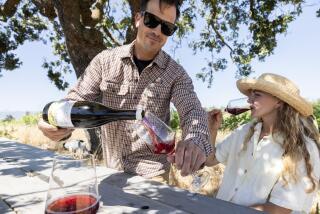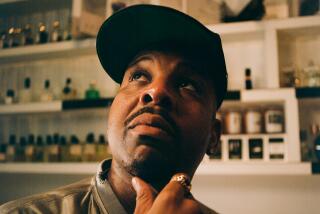Jess Jackson Still Puts Quality First
FULTON, Calif. — Jess Jackson made his mark as a lawyer, carving out an accomplished career as a land-use attorney. He got into winemaking and became a huge success, building an empire on Kendall-Jackson chardonnay.
So far, though, he doesn’t seem to have gotten the hang of retirement.
Jackson, who briefly stepped down from the top spot at Kendall-Jackson Wine Estates Ltd. four years ago, is back as chief executive at age 74, putting his considerable energy into an overhaul of the company’s mainstay Vintner’s Reserve brand.
“I just love farming. I love wine,” Jackson said.
Jackson’s famous chardonnay started out 22 years ago as a bit of an accident. A “stuck” fermentation meant that less of the grape sugar was converted to alcohol, making the wine a little sweeter and scoring an immediate hit with sweet-toothed Americans.
Production of that first vintage, released in 1983, was 18,000 cases.
What happened next was no accident as Jackson built a winemaking business that shipped at least 4 million cases last year and controls 12,000 acres of vineyards.
“He has been a major force in the industry,” said Robert Smiley, a management professor at UC Davis who follows the wine industry.
At $10 to $15 a bottle, Kendall-Jackson Vintner’s Reserve is known for delivering consistent quality in a moderate price range, says Smiley. Open a bottle of Kendall-Jackson Vintner’s Reserve and “you always know what you’re going to get.”
With consistency has come a firm commitment to price point. Jackson has been known to get tough with retailers who try to drop the price too low.
So, it isn’t surprising that Jackson’s response to the current market pressures of less-expensive imports and Bronco Wine Co.’s ubiquitous Charles Shaw -- “Two Buck Chuck” -- is to try to pump up the quality of what’s in the bottle rather than lower prices.
“Quality is what I’m about,” Jackson said. “I want to be proud of my product.”
The Kendall-Jackson Vintner’s Reserve chardonnay has become slightly less sweet -- it’s still pleasantly fruity -- and 65% of the grapes used in the Vintner’s Reserve chardonnay are estate-grown, which means grown and controlled by Kendall-Jackson rather than being bought in bulk on the spot market.
Kendall-Jackson also is aging all of the chardonnay in French oak barrels, which gives wine its “toasty” taste. French oak is the most expensive way to go, but Kendall-Jackson has the advantage of owning a stave mill in a forest in France. The company also has its own nursery and grows its own rootstock.
Such vertical integration “allows us to control the process all the way and the most important thing is right here in the vineyard,” Jackson said.
Vintner’s Reserve is Kendall-Jackson’s best-known tier. The next tier up is Grand Reserve, which costs $20 to $24, and is made from more select grapes.
New this year is Kendall-Jackson Highland Estates, single-estate wines made from the family’s best vineyards. At the top of the tree is the $95 Stature wine.
Jackson is known as the “mountain man” of California wine and a helicopter flight across his far-flung properties explains why. Some of his most treasured vineyards cling to rocky slopes looming above Napa and Sonoma counties.
Vines up here have to struggle to survive, producing a more luscious fruit in a Darwinian effort to propagate. Farmers have to work harder, too, negotiating the rough terrain and working with a narrow window of opportunity between ripe and too-ripe.
“Everything’s desperate up here. The vine’s desperate, the farmer’s desperate,” Jackson said with a laugh. “But when you get it, it’s world-class.”
Tall and strong-boned with a shock of white hair and the craggy looks of a frontiersman, Jackson isn’t nearly as well-known as fellow wine legend Robert Mondavi, whose Robert Mondavi Corp. this month accepted a $1.03-billion buyout from Constellation Brands Inc. Yet in person, Jackson is engaging, launching into vivid descriptions of winemaking laced with a few scholarly discourses on history, another of his interests.
Born in Los Angeles, Jackson was raised in San Francisco and spent summers in wine country as a teenager, working as a lifeguard, picking grapes in those post-Depression days and learning to make wine from an Italian in-law.
As a young man, Jackson turned to drier pursuits, becoming an attorney in the San Francisco area specializing in land-use and property rights issues.
It was in the 1970s that Jackson returned to wine country, buying a ranch in Northern California.
The idea was to have a place to relax, but it wasn’t long before Jackson was embarking on a second career.
“I returned to what I’d always loved,” he said.
The company is a family affair with wife, Barbara Banke, serving as board chairwoman. A number of other family members are involved in the business, including the two daughters he had with first wife Jane Kendall. He also has three children, now teenagers, with Banke.
Over the years, Jackson’s dogged pursuit of success has drawn both bouquets and barbs.
He’s not shy of fighting to protect his company, taking on wine giant E. & J. Gallo in the 1990s with an ultimately unsuccessful suit claiming Gallo’s Turning Leaf brand label copied Kendall-Jackson’s autumn-leaf design.
Retirement notwithstanding, Jackson is thoroughly involved in the brand overhaul, says Kendall-Jackson spokesman George Rose.
“This man’s driven and he’s demanding and at 74 he’s the hardest-working man in the company,” said Rose. “It’s a fascinating experience to be around a whirlwind. Somebody said, ‘Thank God he’s 74 because he would be killing us if he was 50.’ ”
More to Read
Inside the business of entertainment
The Wide Shot brings you news, analysis and insights on everything from streaming wars to production — and what it all means for the future.
You may occasionally receive promotional content from the Los Angeles Times.










